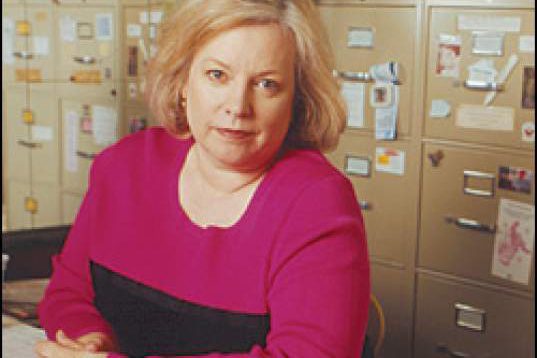When King County resident Bev Harris emerged as one of the nation’s leading critics of electronic voting machines the early 2000s, those who appreciated her work tended toward the left: U.S. Rep. Dennis Kucinich, Howard Dean, even Sen. Hillary Clinton all picked up, in some form or fashion, her talking points about the dangers of leaving vote tabulation in the hands of machines built by private corporations. Meanwhile, she proved most troublesome to those on the right, like Sen. Chuck Hagel, the Republican senator from Nebraska, who had an ownership stake in one of the companies writing software expected to impartially count our votes.
These days, Harris still thinks our elections are ripe for the stealing, and it’s safe to say you won’t hear any “Amens” from Democrats, who have had it up to their donkey ears with Donald Trump’s ravings about the fix being in. But that hasn’t deterred her. If raising the alarms puts her in league with The Donald, so be it. “Although many will say Trump is sort of a flawed model to put forth the message, I think it’s very important that he’s bringing this to the fore,” she says by phone on Thursday.
Now, if you’re a Democrat and you feel your blood pressure surging right now, let me deliver you some beta blockers: Nobody is saying that Trump isn’t being totally self-interested in his claims of rigged elections, nor does this story seek to defend his race-baiting claims of inner-city voter fraud. But what Harris is arguing is that if you were concerned about computerized voting during the Bush years, then you should still be concerned about it today. “It’s not a left/right issue at all … It’s not about the candidates anymore,” Harris says.
Harris’ latest bugaboo is something called “fractional voting,” which refers to a piece of code in some ballot-counting software that allows votes to be counted as a fraction rather than a whole number. This, she says, makes the systems vulnerable to a hack that would predetermine the percentage of the vote each candidate gets, and then match that figure to the number of ballots that come in without causing any logic issues the computer would detect—since it would allow the computer to assign, say, one-fourth of a vote to a candidate in order to make the figures compute.
Harris admits that the issue is complicated—a short YouTube video explaining factional voting posted to her website, blackboxvoting.org, is liable to baffle more than illuminate. Others may find it fringes on the paranoid. But her proposed solution, to this and all other potential software issues, is straightforward: Make ballots available for review by the public. She envisions a system in which photos of marked ballots are posted online so members of the public could conduct crowd-sourced recounts. Since ballots don’t have a voter’s name on them, Harris says there would be no privacy issues.
“Frankly, although the media kind of sat on [Trump] pretty hard for saying he wouldn’t necessarily accept the results, it is ridiculous to say that a candidate or the public has to accept votes it can never verify,” she says. “We absolutely have the right to verify the count and to verify the results we are told are true.”
Many ballot-counting machines already take digital photos of each ballot, so the records are there. But the idea of releasing those images to the public has been hotly contested. In Colorado, courts found they are a public record subject to release; other states have been more reluctant.
Kendall LeVan Hodson, chief of staff at King County Elections, says both ballots themselves and images of ballots are exempt from public disclosure. But she vigorously rejects the idea that this is any reason to doubt the veracity of election results. Rather, Hodson argues that their vote-counting system is already transparent and well-tested. Among other things, the office runs “logic and accuracy tests” that make sure the software is properly counting ballots; such tests are run before the election and then midway through the count. There are also several observers at every step of the way; as we spoke, she noted that several members of the public were touring the election office to look over the system.
“The more we can do to help the public feel more confident, the better,” she says. “We are always happy to have people come down.”
As for getting hacked, the system is completely isolated from the Internet, and any access to the vote counting machines requires several steps of identity authentication. She says that scrutiny of the election system this year has been high, but that was no problem.
“I think it’s higher with any presidential election. I think the last week, week and a half, have been consumed with questions about election security and voter fraud. And we’re totally great with that,” she says.
Harris, to put it lightly, disagrees. But that’s par for the course for the rabble-rouser. Over the years her work has put her at odds with everyone from the Washington Secretary of State to an anti-terrorism task force convened by Bush. Last year, Harris re-emerged in the news when it was revealed that her book, also called Black Box Voting, was discovered on Osama bin Laden’s bookshelf. She was hardly troubled by the revelation.
“It looks like he was reading works that were critical or questioning” of the American system, she told us when the news broke. “You kind of have to look at it as a compliment.”
dperson@seattleweekly.com








